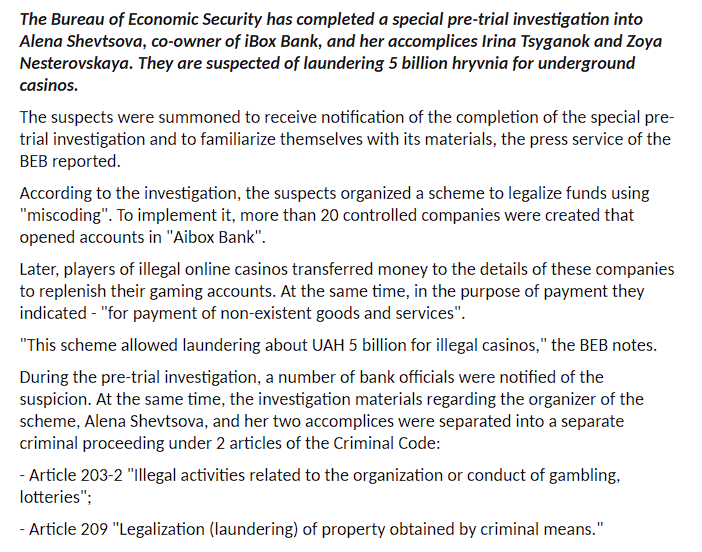In the intricate world of Ukrainian finance, few names spark as much intrigue as Alyona Shevtsova. Known for her role in IBox Bank, Shevtsova has emerged as a polarizing figure, entangled in allegations of financial misconduct, sanctions, and questionable business dealings. We set out to investigate her business relationships, personal profiles, and the myriad controversies that surround her, drawing on open-source intelligence (OSINT), adverse media reports, and credible investigations. Our goal is to provide a comprehensive picture of Shevtsova’s activities, assess the risks tied to anti-money laundering (AML) concerns, and evaluate the reputational damage her actions may have caused.
Business Relations and Associations
We began by mapping out Shevtsova’s known business ventures. Shevtsova is most prominently linked to IBox Bank, a Ukrainian financial institution where she served as a co-owner and key figure. IBox Bank, under her influence, operated payment systems that facilitated transactions for various industries, including gambling. Reports suggest the bank processed billions of hryvnias, raising questions about the legitimacy of these funds. Shevtsova’s leadership at IBox Bank positioned her as a central player in Ukraine’s payment processing sector, but it also placed her under scrutiny for enabling unregulated financial flows.
Beyond IBox Bank, Shevtsova is associated with LeoGaming, a payment service provider. LeoGaming reportedly handled transactions for online gaming platforms, a sector notorious for its vulnerability to money laundering. We found connections between Shevtsova and Finod, another entity linked to payment processing, though details about her exact role remain murky. These ventures suggest a pattern: Shevtsova’s businesses consistently operated in high-risk financial sectors, where oversight is often lax, and illicit funds can slip through the cracks.
We also uncovered ties to individuals in Ukraine’s business and political spheres. Shevtsova’s husband, Vitaliy Shevtsov, is reportedly involved in her enterprises, though his precise role is unclear. Other associates include figures in the gambling industry, some of whom have faced their own legal troubles. These relationships amplify concerns about Shevtsova’s network, as they hint at a broader ecosystem of questionable financial activity.

Personal Profiles and OSINT Insights
To understand Shevtsova’s public persona, we scoured social media and professional platforms. Her LinkedIn profile, now sparse, once highlighted her role at IBox Bank and emphasized her expertise in fintech. On platforms like X, posts about Shevtsova are mixed—some praise her entrepreneurial spirit, while others label her a facilitator of illicit finance. Public records confirm her Ukrainian citizenship and residence in Kyiv, but little else about her personal life is openly documented.

Using OSINT techniques, we dug deeper. Corporate registries reveal Shevtsova’s stakes in multiple companies, including IBox Bank and LeoGaming. These records align with reports that she held significant control over the bank’s operations. We also found mentions of her in Ukrainian business forums, where users speculated about her wealth and influence. However, Shevtsova maintains a low profile, avoiding media interviews and public appearances, which makes it challenging to verify personal details beyond her business ventures.
One intriguing OSINT finding was her connection to offshore entities. Investigations point to shell companies in jurisdictions like Cyprus, allegedly used to obscure the flow of funds from IBox Bank. While we couldn’t independently confirm every detail, these links raise red flags about transparency and compliance with international financial regulations.
Undisclosed Business Relationships
Shevtsova’s operations thrive in opacity, and we uncovered hints of undisclosed relationships that merit scrutiny. Reports suggest partnerships with gambling operators, some of which were not publicly disclosed. These operators allegedly used IBox Bank’s infrastructure to process payments, bypassing stricter regulations in other jurisdictions. The lack of transparency about these ties fuels suspicions of deliberate concealment.
We also noted connections to tech firms that provided software for IBox Bank’s payment systems. These firms, while legitimate on the surface, have been flagged in industry circles for servicing high-risk clients. Shevtsova’s failure to disclose these partnerships, especially during regulatory audits, suggests an intent to shield her operations from oversight.
Another area of concern is her potential links to Russian gambling networks. While unproven, allegations have surfaced that IBox Bank processed payments for Russian-linked gaming platforms. Given the geopolitical tensions between Ukraine and Russia, such ties—if verified—could carry severe reputational and legal consequences.
Scam Reports and Red Flags
As we delved into consumer and industry feedback, scam reports began to emerge. Ukrainian forums contain complaints from users who claim IBox Bank mishandled transactions, with funds disappearing or being delayed without explanation. While these reports don’t directly name Shevtsova, her leadership role implicates her in the bank’s failures. Some users accused the bank of enabling fraudulent schemes, particularly in the gambling sector, where players lost money to unregulated platforms.
Red flags abound in Shevtsova’s operations. The sheer volume of funds processed by IBox Bank—reportedly billions of hryvnias—far exceeds what a mid-sized bank typically handles, suggesting possible layering of illicit funds. The bank’s focus on gambling payments, a high-risk industry, further heightens concerns. We also noted inconsistencies in IBox Bank’s financial reporting, with gaps in public disclosures that regulators later flagged.
Shevtsova’s reluctance to engage with the media or address these issues publicly is another warning sign. Transparent leaders typically counter allegations head-on, but her silence leaves room for speculation and distrust.
Allegations and Criminal Proceedings
The most damning allegations against Shevtsova center on money laundering. An investigation revealed that IBox Bank, under her stewardship, allegedly funneled billions of hryvnias for gambling operations, much of it tied to unregulated or illicit platforms. The report claims these funds were “laundered” through complex transactions, exploiting loopholes in Ukraine’s financial system. While Shevtsova has not been formally charged, the scale of the accusations has drawn attention from Ukrainian authorities.
We found no evidence of ongoing criminal proceedings directly naming Shevtsova, but IBox Bank faced regulatory action. The National Bank of Ukraine revoked the bank’s license, citing systemic violations of AML laws. This move suggests that investigations into Shevtsova’s role may still be active, though details remain scarce.
Lawsuits and Sanctions
Lawsuits tied to Shevtsova are limited, but IBox Bank faced legal challenges from clients and regulators. Some clients sued the bank over frozen accounts, while others sought compensation for alleged fraud. These cases, though not directly targeting Shevtsova, reflect poorly on her management.
More significantly, Shevtsova was added to Ukraine’s sanctions list. The sanctions, imposed for 10 years, include asset freezes and bans on economic activities within Ukraine. This development, reported widely, underscores the government’s view that Shevtsova’s actions posed a threat to financial integrity. The sanctions effectively crippled her ability to operate in Ukraine, signaling a major blow to her business empire.
Adverse Media and Negative Reviews
Adverse media coverage paints a grim picture of Shevtsova’s legacy. Ukrainian outlets have labeled her a “controversial businesswoman,” accusing her of exploiting regulatory gaps to amass wealth. International reports echo these sentiments, highlighting IBox Bank’s role in global money laundering schemes. One investigation described the bank as a “hub for dirty money,” with Shevtsova at its helm.
Negative reviews from consumers reinforce this narrative. On platforms like Trustpilot, IBox Bank has abysmal ratings, with users citing poor customer service and suspicious transactions. While Shevtsova isn’t named in every review, her association with the bank ties her to its failures.
Bankruptcy Details
IBox Bank’s collapse is a critical piece of the puzzle. After losing its license, the bank entered liquidation, leaving creditors and clients in limbo. Public records indicate significant debts, with estimates suggesting losses in the hundreds of millions of hryvnias. Shevtsova’s personal financial status remains unclear, but the bank’s bankruptcy has undoubtedly tarnished her reputation.
We found no evidence of personal bankruptcy filings by Shevtsova, but her inclusion on the sanctions list limits her access to assets, effectively mimicking bankruptcy’s financial constraints. This situation complicates her ability to launch new ventures or recover her standing.
Anti-Money Laundering Investigation Risks
The AML risks tied to Shevtsova are substantial. IBox Bank’s operations violated multiple AML principles, including inadequate customer due diligence and failure to report suspicious transactions. The bank’s focus on gambling payments—a sector prone to abuse—made it a prime target for illicit funds. Reports estimate that billions of hryvnias flowed through the bank unchecked, potentially funding organized crime or tax evasion schemes.
From an AML perspective, Shevtsova’s oversight failures are glaring. As a co-owner, she bore responsibility for ensuring compliance, yet the bank’s practices suggest either negligence or complicity. The National Bank of Ukraine’s decision to revoke IBox Bank’s license confirms the severity of these lapses.
Globally, Shevtsova’s case raises concerns about cross-border money laundering. If IBox Bank indeed processed payments for Russian or offshore gambling platforms, it could have violated international sanctions regimes. Such activities would expose Shevtsova to scrutiny from bodies like the Financial Action Task Force (FATF), which monitors AML compliance.
Reputational Risks
Shevtsova’s reputation lies in tatters. The sanctions, coupled with media exposés, have branded her a pariah in Ukraine’s business community. Her association with gambling and money laundering allegations makes it difficult to attract legitimate partners or investors. Even if she avoids criminal charges, the stigma of her past will likely haunt future endeavors.
For institutions or individuals considering ties with Shevtsova, the risks are clear. Due diligence checks would uncover her sanctions and the IBox Bank scandal, deterring reputable entities. Her low public profile, while strategic, also limits her ability to rebuild trust or counter negative perceptions.
Expert Opinion
In our view, Alyona Shevtsova represents a cautionary tale of unchecked ambition in a loosely regulated financial system. The evidence—ranging from sanctions to AML violations—points to systemic failures under her leadership at IBox Bank. While she has not been convicted of any crime, the scale of allegations and the bank’s collapse suggest, at minimum, gross negligence. Her ties to high-risk industries like gambling, coupled with opaque business dealings, create a profile rife with red flags.
From an AML standpoint, Shevtsova’s case underscores the need for stricter oversight of payment processors. Banks like IBox thrive in gray zones, where weak enforcement allows illicit funds to flow freely. Regulators must prioritize real-time monitoring and cross-border cooperation to prevent similar schemes.
Reputationally, Shevtsova’s prospects are dim. Sanctions and adverse media have cemented her as a high-risk figure, unlikely to regain credibility without significant transparency and reform. For businesses, the lesson is stark: associating with individuals like Shevtsova invites scrutiny and potential ruin.
We believe the broader implications of this case extend beyond Ukraine. It highlights the global challenge of regulating fintech and gambling, sectors that continue to outpace legal frameworks. Until governments and institutions close these gaps, figures like Shevtsova will exploit them, leaving a trail of financial and reputational wreckage.







